In search of the first hard rock/heavy metal riff
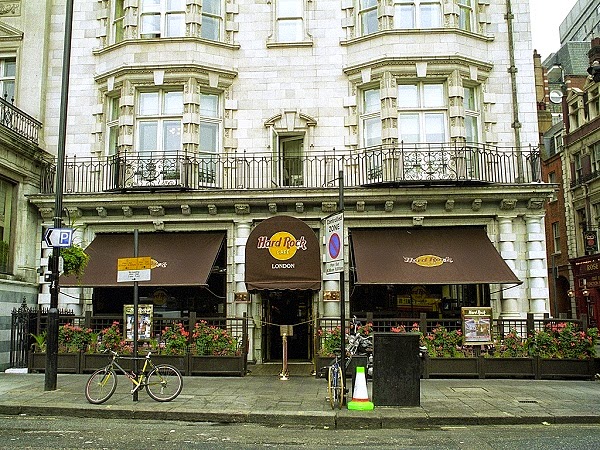 |
| The original Hard Rock cafe in London was great and unique when it opened in 1971. Now, of course, it’s a bit of a cliche, with branches all over the world |
Guys, in general, liked it hard and riff-driven. Girls usually preferred the softer songs. We’re generalising here, of course. Some girls liked it hard. And we mustn’t forget, when a certain rock & roll themed restaurant first opened its doors in London in 1971, they called it “Hard Rock” because metal wasn’t even invented.
the 1950s, in those first years of the 60s, were always guaranteed to get the
room rocking, before the usual dance hall fights erupted. Three songs from
those days stick in the mind and, remarkably, all were written by those
illustrious Jewish-American song writers, Jerry Leiber and Mike Stoller, for
that seminal African-American rock & roll group, the Coasters.
on rock and pop music, they were the first group to be inducted into America’s
Rock ‘n’ Roll Hall of Fame in 1987. Yet, when I was lucky enough to see them ‘live’,
in an outer-suburban beer barn in Melbourne, Australia, in 1974, called South
Side Six from memory, the Coasters had been relegated to playing second-rate
out-of-town venues. Such is the fickleness of the music industry, as every
musician can testify. They were excellent, by the way.
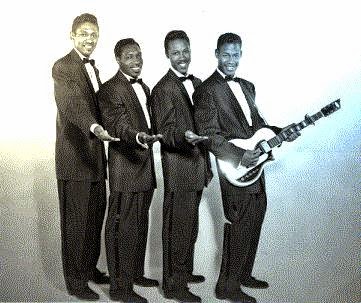 |
| Rock & Roll pioneers: the fabulous Coasters |
guitar bands seemed to cover were: “Poison Ivy”, “Love Potion No. 9” (given to
The Clovers first) and “I’m A Hog For You (Baby)”.
were standard fare for every band that rocked in Britain before the Beatles
exploded, including the Beatles, themselves. I’m sure that rings true for
America, too.
early guitar British bands was ”Louie Louie” – a Hot Chocolate offshoot of which was recently used as the theme
song to Louis C.K.’s award-winning TV show. Written in 1955 by Richard Berry,
“Louie Louie” was the catalyst for the first hard rock riff that led to metal.
And here’s why. It’s generally accepted that The Kinks’ “You Really Got Me” was
the first hard rock riff in rock history, due to their lead guitarist Dave
Davies slashing his amp’s speaker cone with a razor to get those fabulous
distorted power chords. If you’d like to remind yourself of the early Kinks
with “You Really Got Me”, they’re here below.
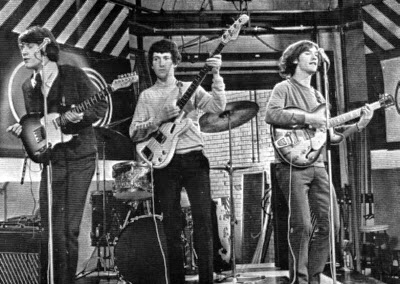 |
| Early Kinks before they were banned in America |
Me” here: https://www.youtube.com/watch?v=Eq_KQYVPadQ
writer, Ray Davies, has said that he wrote “You Really Got Me” whilst trying to
work out the chords to “Louie Louie”. Whether this was Richard Berry’s 1957 original
track, Rockin’ Robin Roberts’ adaptation in 1961 or the 1963 worldwide hit
version by Portland’s The Kingsmen, you’ll have to ask Ray Davies. The Kingsmen’s
track, however, remains the best known of some 150 covers including by the
Beatles, Beach Boys, Black Flag, Clash, Doors, Bob Dylan, Grateful Dead, Iggy
and the Stooges (see last post), Led Zeppelin, Otis Redding, Motorhead, Mothers
of Invention (said to have fired their guitarist because she couldn’t play it),
Trogs (whose “Wild Thing” uses a similar chord progression) and so on.
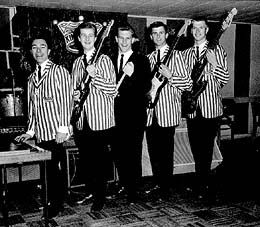 |
| The original Kingsmen in 1963. It was probably their version of “Louie Louie” that inspired Ray Davies to write “You Really Got Me”. |
to The Kingsmen’s “Louie Louie” here: https://www.youtube.com/watch?v=XL20vPIXs-A
The Kinks’ “Milk Cow Blues”: https://www.youtube.com/watch?v=qwDBepAv4KU
the post- before-last will know it as Sleepy John Estes’ “Milk Cow Blues”. I’ve
included it to give an example of just how good a blues rock band The Kinks
were before Ray’s song writing lost its youthful bite (in my opinion) and
started bordering on the twee and comical. Funnily enough, I was working
alongside their PR, Marion Rainford, in London that very year and remember my despair
when The Kinks’ came out with “Ape Man”. Marion was truly delightful, kind and
helpful to a young boy (me) so I thought I’d check her out to see if she was
still around. I found her in a local London newspaper. Apparently she gave up
rock to teach ballroom dancing. Have a read, if only to find out how rock PRs
can have a very un-rock life after rock & roll:
didn’t mention where I worked when inadvertently bumping into Dave Davies at
the Chesford Grange Hotel near Warwick, England, at a gig there in 1970. Being
1970, pathetic English snobbery was still in full swing. In 1970, being dressed
like long-haired 20-year-olds meant not being let into the hotel’s comfortable lounge
bar for a drink, rather than putting up with the hot and stuffy beer tent laid
on for the music punters.
 |
| Dave Davies didn’t just play the first hard rock/ heavy metal power chords, he was a nice person, too |
boomed out, “I’m in here. Why can’t they be?” From inside the lounge bar
strode Dave Davies who proceeded to give the door monkeys what for. “They’re
dressed the same as me. You can’t stop them coming in”.
inviting an unruly group of five of us into the plush lounge and chatting amiably
with us until it was time to go on stage. Dave hadn’t a clue that I worked with
Marion. We were complete strangers, which made me realise what a nice man he
was and, presumably, still is.
America was cut short in 1965 by a four year ban by the American Federation of
Television and Recording Artists, said to have arisen due to The Kinks not
paying their union fees after playing a Dick Clark special on NBC. That Ray
Davies had reportedly punched a union official for calling England ‘communist’
wouldn’t have helped.
years of the Kinks’ career when the original band was performing at its peak.”
lost its edge, became middle-of- the-road
 |
| Ray Davies. To me, Ray stopped writing great rock & roll songs and The Kinks stopped being a great rock & roll band after they were barred from playing in America in 1965 |
and started concentrating on
predominantly English themes like “The Village Green Preservation Society” and “Arthur”.
That’s just my view, of course. The majority of British Kinks fans would violently
disagree and say this was when Ray Davies started writing his best songs like “Waterloo
Sunset”, “Lola” and so on.
with heavy riffs and just wonder how the band would have developed had they
been allowed to regularly tour America. Let’s finish with a Kinks song from 1965,
the year they were banned in the USA; the year, for rock and The Kinks, as far
as I’m concerned, the music died.
And All of the Night”: https://www.youtube.com/watch?v=F4DV-5d6a5g
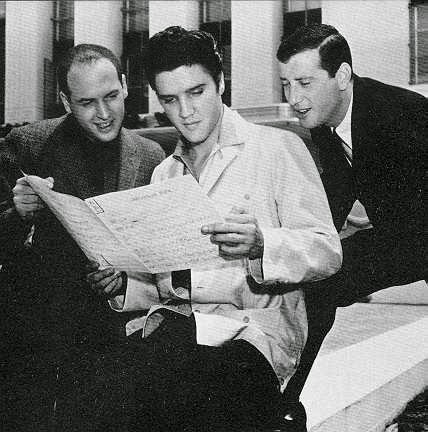

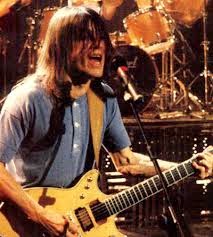

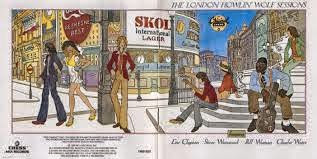
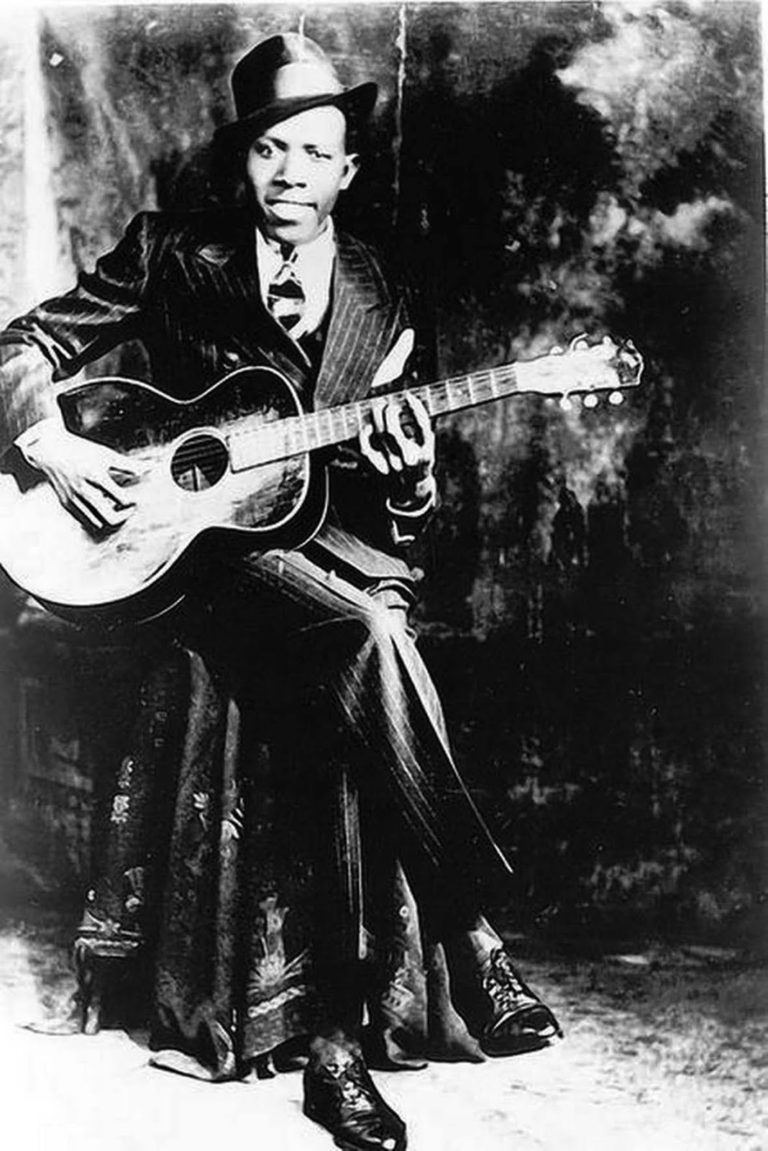
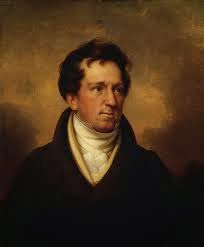
You might want to open up a debate about whether “Louis, Louis“ is the first riff-rock song, or merely a three chord vamp.
Some 2,000 artists, it’s estimated, have covered the Kingsmen’s ‘Louie Louie’ including the Beatles, Beach Boys, Blondie, the Clash, Bob Dylan, Grateful Dead, Iggy and the Stooges, Led Zeppelin, Otis Reading, Motorhead, the Troggs’ (whose ‘Wild Thing’, incidentally, uses the same chord structure), and Frank Zappa and the Mothers of Invention. Some describe ‘Louie Louie’ as the first garage rock record although a single from 1958 might stake that claim. It’s ‘She’s My Witch’ by Chicago-born Kip Tyler (1929 – 1996). Featuring a twanging Duane Eddie-style guitar riff, ‘She’s My Witch’ was years ahead of its time. Demonstrating how American rock and roll was shifting to a more modern sound, any potential influence of ‘She’s My Witch’ and Kip Tyler seems to have been swamped by the British Invasion.